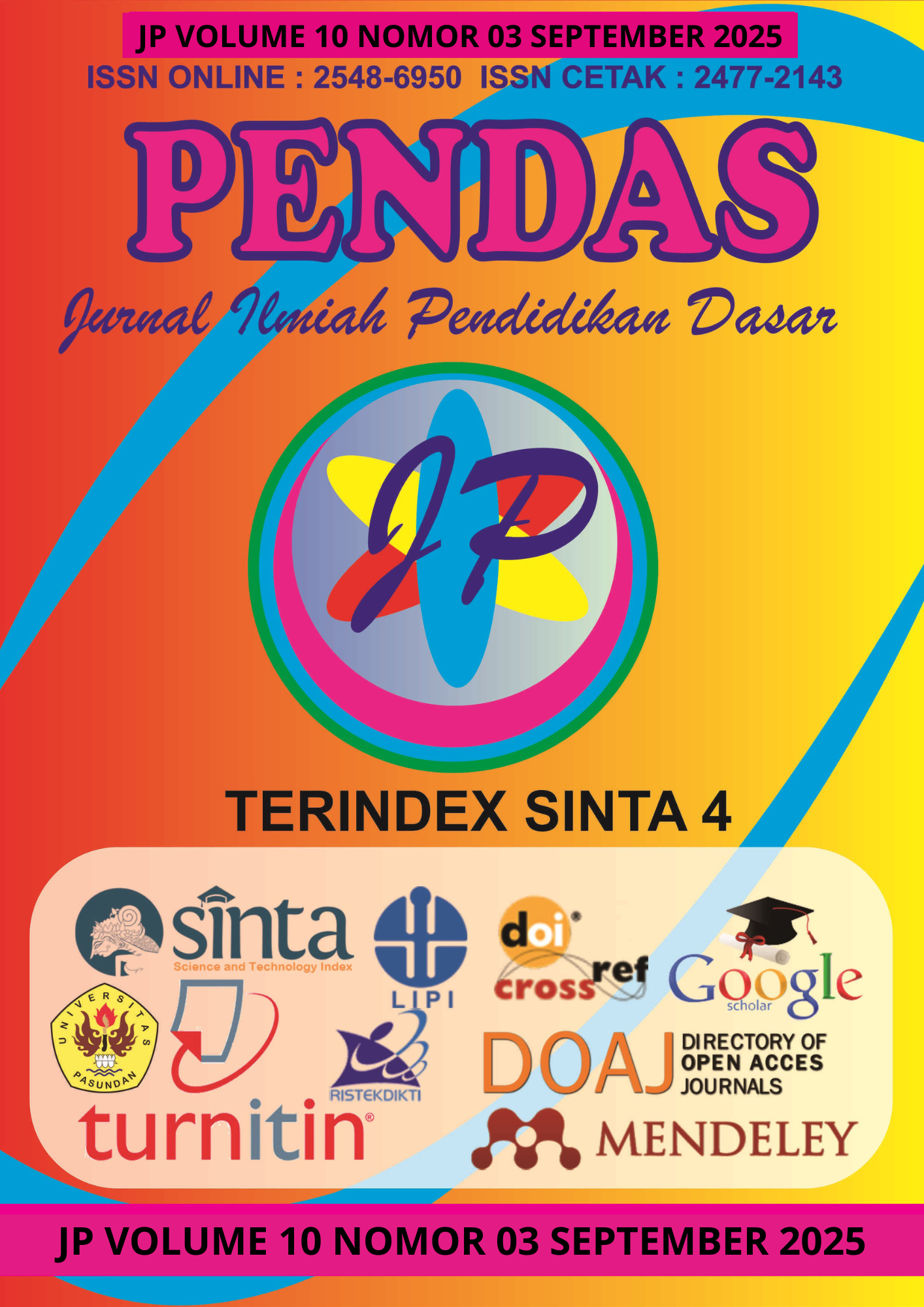OPTIMALISASI HASIL BELAJAR MELALUI INTEGRASI KECERDASAN BUATAN DALAM PEMBELAJARAN ADAPTIF PADA MATA KULIAH PROFESI PENDIDIKAN
DOI:
https://doi.org/10.23969/jp.v10i3.29115Keywords:
learning outcomes, artificial intelligence, adaptive learning, educational professionAbstract
This study aims to optimize learning outcomes through the integration of artificial intelligence in adaptive learning for the Professional Education course. A mixed methods sequential explanatory design was employed with 160 students from the Physical Education, Health and Recreation Study Program at Universitas Negeri Makassar, divided into experimental (n=80) and control groups (n=80). The experimental group utilized AI-integrated adaptive learning systems (ChatGPT Plus, Perplexity AI, and Claude), while the control group used conventional learning methods. Data were collected through learning achievement tests and in-depth interviews. Results showed a significant difference in posttest scores between groups (t=7.893; p<0.001), with the experimental group achieving a mean gain score of 19.3 points compared to 11.1 points in the control group. Qualitative findings revealed that AI integration enhanced learning motivation, facilitated access to information, and enabled learning personalization. However, technical challenges and ethical concerns regarding academic integrity were identified. This study concludes that strategic AI integration in adaptive learning significantly improves learning outcomes in Professional Education courses while requiring careful consideration of pedagogical, technical, and ethical aspects.
Downloads
References
Andriani, F., & Nugraheni, N. (2024). Analisis Karakteristik Gaya Belajar Siswa dalam Pembelajaran Berdiferensiasi. Jurnal Riset Pendidikan Dasar (JRPD), 5(1), 33. https://doi.org/10.30595/jrpd.v5i1.16067
Batubara, H. H., & Ariani, D. N. (2019). Model Pengembangan Media Pembelajaran Adaptif di Sekolah Dasar. Muallimuna : Jurnal Madrasah Ibtidaiyah, 5(1), 33. https://doi.org/10.31602/muallimuna.v5i1.2356
Bayly Castaneda, K., Ramirez Montoya, M.-S., & Morita Alexander, A. (2024). Crafting personalized learning paths with AI for lifelong learning: a systematic literature review. Frontiers in Education, 9. https://doi.org/10.3389/feduc.2024.1424386
du Plooy, E., Casteleijn, D., & Franzsen, D. (2024). Personalized adaptive learning in higher education: A scoping review of key characteristics and impact on academic performance and engagement. Heliyon, 10(21), e39630. https://doi.org/10.1016/j.heliyon.2024.e39630
Ellikkal, A., & Rajamohan, S. (2025). AI-enabled personalized learning: empowering management students for improving engagement and academic performance. Vilakshan - XIMB Journal of Management, 22(1), 28–44. https://doi.org/10.1108/XJM-02-2024-0023
Fathurohman, A. (2021). Machine Learning Untuk Pendidikan: Mengapa Dan Bagaimana. Jurnal Informatika dan Teknologi Komputer (JITEK), 1(3), 57–62. https://journal.amikveteran.ac.id/index.php/jitek/article/view/306
Gârdan, I. P., Manu, M. B., Gârdan, D. A., Negoiță, L. D. L., Paștiu, C. A., Ghiță, E., & Zaharia, A. (2025). Adopting AI in education: optimizing human resource management considering teacher perceptions. Frontiers in Education, 10. https://doi.org/10.3389/feduc.2025.1488147
Nisa, Y. K., & Sulianto, J. (2024). Refleksi Mata Kuliah Pemahaman Peserta Didik dan Pembelajarannya pada Program PPG Prajabatan. Jurnal Basicedu, 8(4), 3124–3136. https://doi.org/10.31004/basicedu.v8i4.8541
Putro, A. N. S., Wajdi, M., Siyono, Perdana, ditya N. C., Saptono, Fallo, D. Y. A., Khoirotunnisa, A. U., Ningtyas, W. A., Leuwol, F. S., Pationa, S. B., Kumalasanti, R. A., & Setiyatna, H. (2023). Revolusi BelajarDi Era Digital (A. N. S. Putro (ed.); pertama). PT Kodogu Trainer Indonesia.
Rahayu, S. (2023). The Potential Impact of Artificial Intelligence on Education: Opportunities and Challenges. educatio, 9(4), 2132–2140.
Rahiman, H. U., & Kodikal, R. (2024). Revolutionizing education: Artificial intelligence empowered learning in higher education. Cogent Education, 11(1). https://doi.org/10.1080/2331186X.2023.2293431
Roihan, A., Sunarya, P. A., & Rafika, A. S. (2020). Pemanfaatan Machine Learning dalam Berbagai Bidang: Review paper. IJCIT (Indonesian Journal on Computer and Information Technology), 5(1). https://doi.org/10.31294/ijcit.v5i1.7951
Sappaile, B. I., Nuridayanti, N., Judijanto, L., & Rukimin, R. (2024). Analisis Pengaruh Pembelajaran Adaptif Berbasis Kecerdasan Buatan terhadap Pencapaian Akademik Siswa Sekolah Menengah Atas di Era Digital. Jurnal Pendidikan West Science, 2(01), 25–31. https://doi.org/10.58812/jpdws.v2i01.937
Strielkowski, W., Grebennikova, V., Lisovskiy, A., Rakhimova, G., & Vasileva, T. (2025). AI-driven adaptive learning for sustainable educational transformation. Sustainable Development, 33(2), 1921–1947. https://doi.org/10.1002/sd.3221
Waliulu, Y. S., Wahid, Arif, M., Mokoginta, D., Novita, R., Rukhmana, T., Deni, A., Sentryo, I., Prastawa, S., & Iswahyudi, M. S. (2023). Pendidikan dalam Transformasi Digital (I. P. Kusuma (ed.); Pertama). Cendikia Mulia Mandiri.
Wang, L.-H., Chen, B., Hwang, G.-J., Guan, J.-Q., & Wang, Y.-Q. (2022). Effects of digital game-based STEM education on students’ learning achievement: a meta-analysis. International Journal of STEM Education, 9(1), 26. https://doi.org/10.1186/s40594-022-00344-0
Downloads
Published
Issue
Section
License
Copyright (c) 2025 Pendas : Jurnal Ilmiah Pendidikan Dasar

This work is licensed under a Creative Commons Attribution 4.0 International License.














































